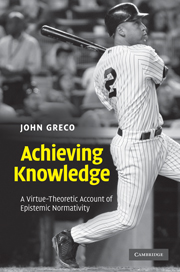4 - Against evidentialism
Published online by Cambridge University Press: 05 June 2012
Summary
A natural way to think about epistemic normativity is in terms of evidence. It is a good thing, epistemically speaking, to have evidence in favor of one's beliefs, and a bad thing to have evidence against one's beliefs. So much is platitudinous. A number of philosophers, however, have thought that the notion of evidence is absolutely central to knowledge-relevant normativity. Specifically, they have thought that whether a belief has k-normative status is entirely a function of one's evidence. Put differently: the facts about k-normative status supervene on the facts about evidence.
This sort of approach in epistemology is appropriately labeled “evidentialism.” Keeping in mind that we are interested in knowledge-relevant normativity specifically, let us call this approach to epistemic normativity “k-evidentialism” (or KE).
KE. The facts about k-normative status supervene on the facts about evidence.
Among contemporary philosophers, Earl Conee and Richard Feldman come closest to explicitly endorsing k-evidentialism. First, Conee and Feldman famously endorse evidentialism about “epistemic justification,” where the latter notion marks an important part of the full normative status required for knowledge. Here are some typical passages:
As we understand it, evidentialism is a view about the conditions under which a person is epistemically justified in having some doxastic attitude toward a proposition. It holds that this sort of epistemic fact is determined entirely by the person's evidence. In its fundamental form, then, evidentialism is a supervenience thesis according to which facts about whether or not a person is justified in believing a proposition supervene on facts describing the evidence that the person has.
- Type
- Chapter
- Information
- Achieving KnowledgeA Virtue-Theoretic Account of Epistemic Normativity, pp. 58 - 68Publisher: Cambridge University PressPrint publication year: 2010



